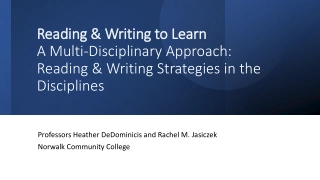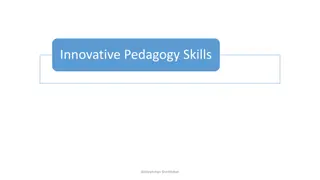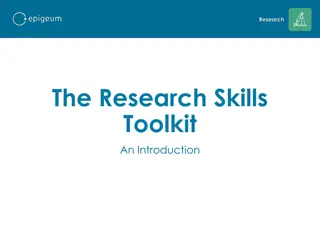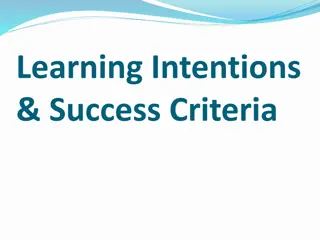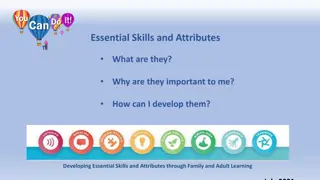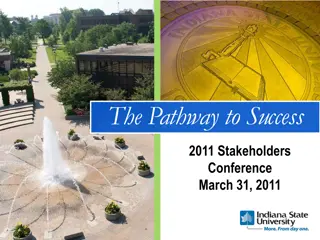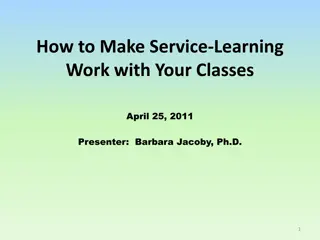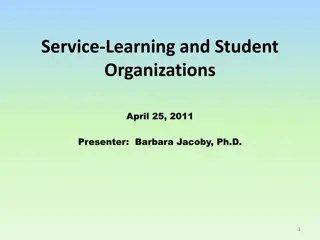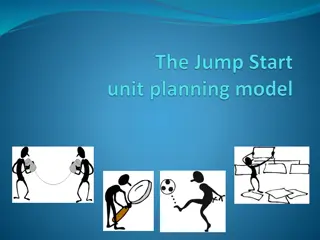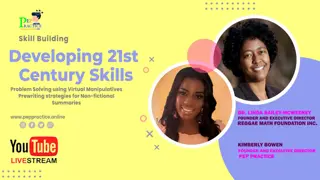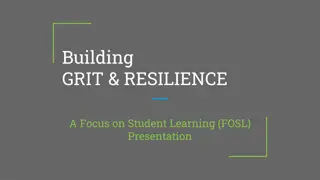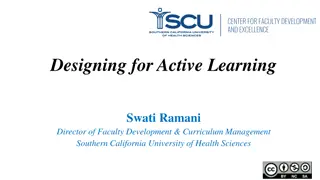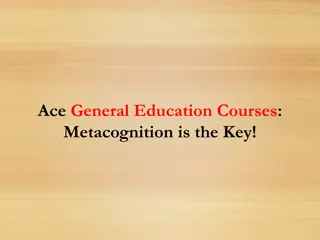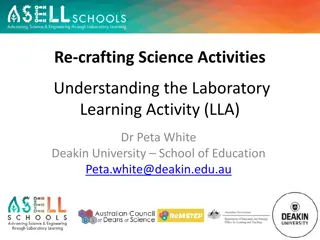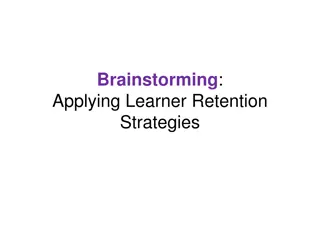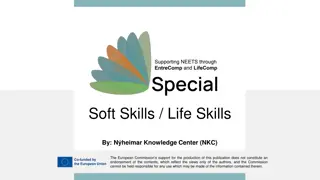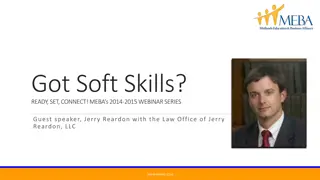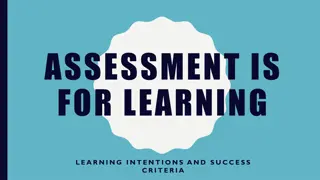Enhancing Learning Skills and Success Strategies
Explore the factors crucial for successful learning, such as prior knowledge, motivation, emotion regulation, and time management. Delve into different approaches to learning, including deep, surface, and systematic approaches. Discover effective study techniques, including self-testing, distributed practice, and elaborative interrogation, along with the importance of time management in achieving academic excellence.
Download Presentation

Please find below an Image/Link to download the presentation.
The content on the website is provided AS IS for your information and personal use only. It may not be sold, licensed, or shared on other websites without obtaining consent from the author.If you encounter any issues during the download, it is possible that the publisher has removed the file from their server.
You are allowed to download the files provided on this website for personal or commercial use, subject to the condition that they are used lawfully. All files are the property of their respective owners.
The content on the website is provided AS IS for your information and personal use only. It may not be sold, licensed, or shared on other websites without obtaining consent from the author.
E N D
Presentation Transcript
Study- and Team-work Skills 28.8.2023, ENG masters Study psychologist Sanni Saarim ki, sanni.saarimaki@aalto.fi Materials by Aalto Psychologists Team
What kind of change would you like to make in the world? in yourself? What do you think are the most important elements for successful learning?
Which factors are most important? 1. Students prior / grounding knowledge and self-efficacy 2. Motivation to be or become successfull 3. Emotion regulation skills 4. Skills to regulate/modify learning technique 5. Time management and skills being productive (not to procrastinate) Richardson et al. 2012 Psychological Correlates of University Students Academic Performance: Meta-analysis
Curiosity Deep approach to learning: understanding the meaning of the knowledge
What is your approach to learning? Deep approach Looking for deeper understanding Relating new ideas to previous knowledge Surface approach Memorizing and repeating information Often motivated by fear of failure Systematic approach Awareness of criteria Planning, time management
Deep Approach to Learning Really understanding instead of memorizing Ask questions: How do we know it? Why is it that way? What does the knowledge mean? How can I use this knowledge? Combine the new knowledge to your prior knowledge, look for deeper understanding + Systematic approach: awareness of criteria, planning, time management
The most effective study techniques How to use it? 1. Make short exams for yourself and answer them! 2. Don t study a long period at once, distribute it between several days/weeks so that the amount you study in one day stays reasonable 3. Ask why / how questions and make explanations! 4. Write or talk about what new have you learned! 1. Practice testing 2. Distributed practice 3. Elaborative interrogation 4. Self-explanation SEE: Dunlosky et al. (2013) Improving Students Learning With Effective Learning Techniques
Emotions in Learning Curiosity, interest, proud, joy -> resources for learning Fear of failure, shame, embarrassment -> can prevent/hinder learning Understanding that failures are part of learning Kindness to yourself instead of hard self-criticism Learn more: http://self-compassion.org/ Share your feelings
Learning Together Building knowledge is a shared process Being part of the academic community Group-work skills Teaching others is an effective way to learn Social support is related to success in studies
2. Study skills: How to maintain study habits and daily rhythm? 1. Personal resources: How to foster joy and wellbeing? Create a daily study schedule with enough breaks Sometimes plans fail -try to accept it and try again Set small and clear goals that keep you motivated Focus on one thing at a time be mindful and avoid interruptions. For example, try putting your phone in an airplay mode when you study Make your study-space as cozy as possible Focus on things that are meaningful to you and bring you joy Take the time to exercise and rest the way that suits you best remember both, your body and mind Try to get enough sleep and nutrition Most of all, try to be kind to yourself 4. Study environment: How to maintain contact with peers? 3. Teaching Schedule (face to face or video) study groups with your peers Set shared goals with your peers and set rewards for work completed Remember also social time with your peers, not just studying In addition to being kind towards yourself, be kind and non-judgmental towards others Attend study groups and tutoring and when possible, come to campus! Remember that you can always reach out, ask for advice, feedback and guidance from your teacher, academic advisor and Learning services
Memorize the best team/ group work experience you have ever had - - What made it so good/ successful? What kind of stages were there? How did that group/team evolve during the process?
An Effective Team Shared and accepted goals Roles and tasks clearly defined Interaction, Communication Resources, Schedule
Stages of a Group Forming Adjourning Storming Performing Norming
Forming Finding the roles Unsecurity: do I belong to the group? Finding the goals and tasks of the group Often positive, enthusiastic feelings In unclear or undefined situations we try to find familiar roles When we feel more secure in the group we can take more flexible roles
Storming Individuals try to stand out, different opinions There might be resistance to the tasks or goals Dissatisfaction with the group is possible People form pairs or sub-groups
Norming Team spirit, sense of being part of the group Clear rules and norms Avoiding conflicts -> the group might be less creative or effective Group thinking: people might change their opinions towards the average opinion
Performing Everybody is working towards the goals Roles are flexible, people can make most of their strenghts Everybody takes responsibility for the work Good spirit in the team, openess, flexibility
Communication in a Group Communicating thoughts clearly Defining and analyzing problems Asking for specifications and reasons Finding and evaluating options Task- oriented Skills: Listening Showing empathy and support Creating good team spirit Encouraging others Solving conflicts People- oriented Skills:
Some Guidelines for Good Interaction Respectful Engagement ALSO ONLINE! Conveying presence Being genuine Communicating affirmation, expressing recognition Effective listening Supportive communication: specific and descriptive communication, requests rather than demands Task Enabling Teaching & helping others Altering the process, timing or substance
Some Guidelines for Good Interaction Trusting Sharing information Giving away control Inclusive language Solving conflicts Looking at the problem from different angles may be useful Talk about facts, avoid blaming anyone Figure out everyone s needs and goals Look for a win-win situation
References Dutton Jane (2003): Energize Your Workplace How to Create and Sustain High-Quality Connections at Work. Jossey-Bass, San Francisco. Kopakkala Aku (2005): Porukka, jengi, tiimi Ryhm dynamiikka ja siihen vaikuttaminen. Edita, Helsinki. Kielijelppi: www.kielijelppi.fi Belbin website www.belbin.com
Starting Point of Wellbeing 2023 WHAT WE DO? WHO WE ARE? WHERE TO FIND US? Starting Point of Wellbeing offers students advice and guidance on services related to wellbeing and study skills No appointment needed; drop-in service currently available online & on campus in Finnish & in English Aalto study and career planning psychologists Guidance counsellors Finnish Student Health Service (FSHS) Aalto chaplains UniSport Starting Point of Wellbeing | Aalto University In cooperation with Student union AYY Nyyti ry Mental Wellbeing for Students / MielenTEKoja HelsinkiMissio In addition to drop-in advising, SPW offers co-studying sessions, other events and groups and workshops
Support for learning, wellbeing and study-skills Where to get guidance and support? | Aalto University Starting Point of Wellbeing | Aalto University Individual study arrangements | Aalto University


